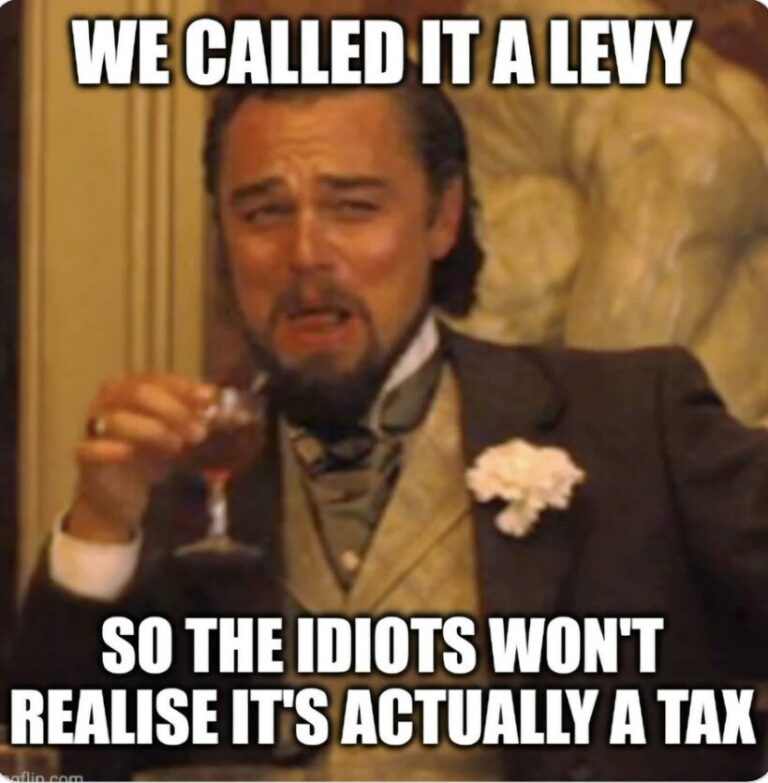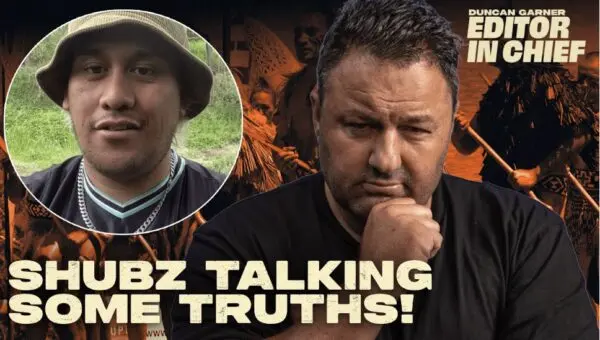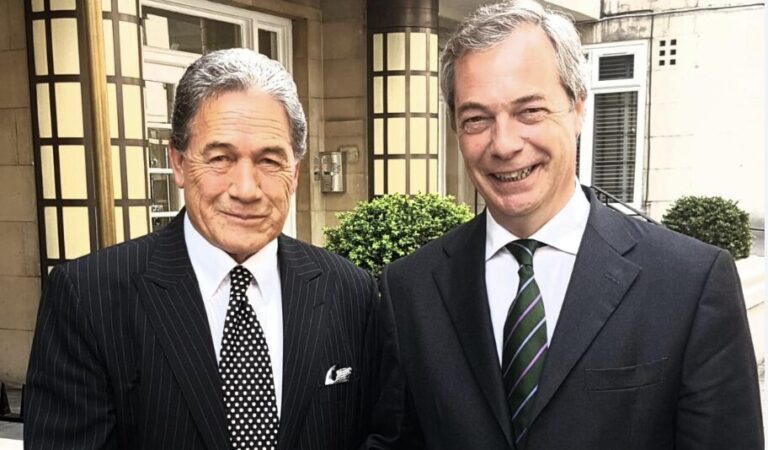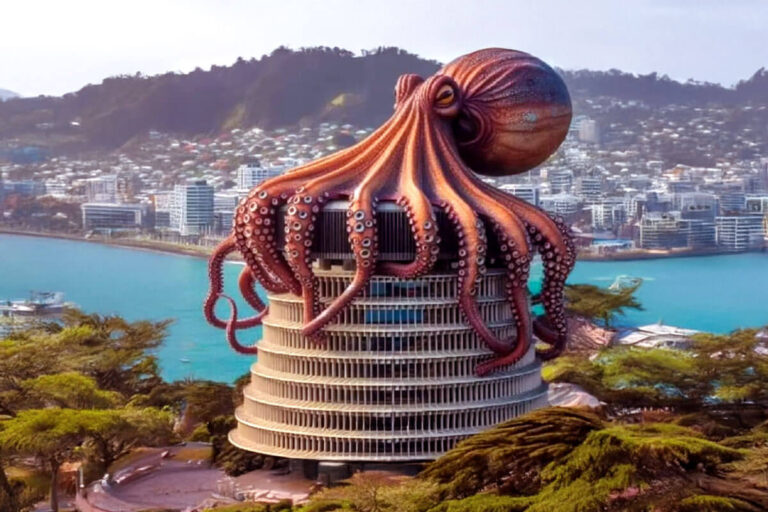How Simon Bridges beats globalist Jacinda in 2023
That gagging sound you hear is Jacinda reading the neoliberal Mfat wishlist she was forced to regurgitate at the end of APEC.
The last unchallenged bastion of NZ neoliberalism is the free trade zeal that stops nationalization of economic sovereignty. Jacinda is a globalist who supports transnational labour chains which exploit workers and locks us into corporate subservience.
This pandemic has shocked neoliberal supply chains and is a precursor to the constant state of external shocks that the climate crisis will generate.
Now is a time for economic self sufficiency NOT corporate globalism!
Judith is so focused on stopping David Seymour from becoming the Leader of the Opposition that she can’t be the Leader of the Opposition.
National have no policy announcements, no big ideas and no intellectual integrity.
Let’s say Simon takes over as leader, then what?
Replacing leaders won’t restore National’s mana and with ACT so hard right, the center voters Labour picked up in 2020 will cling to them in 2023!
Simon must hit the ground running with a radical agenda on the only political rail he could dominate – isolationism.
What if Simon announces another Orewa Speech but this time gives the speech of his career?
What if he starts talking about re-reading some of Robert Muldoon’s books and speeches? What if Simon points out the reality of Covid isolationism and argues the case for Fortress NZ, spurning free market trade for a hyper vigilant border and self sufficient industry.
What if Simon proposed isolationism and self reliance? Imagine the titanic shift in the political tectonic plates as National went back to its Muldoon isolationism and nationalism.
A make NZ great again campaign without ever having to say those words.
Radical nationalism that seeks to protect all bypasses race and class lines.
Such isolationism would squeeze ACT out while pulling the center out of Labour.
It’s a mad tactic that could ignite a deep sense of insecurity in a Covid plagued world with increasing climate crisis events.
The psyche of a people locked down is exploding with a surge in violence and abuse as frightened people grappling with uncertainty vent at each other.
A state that shuts the borders and promises the hope of self reliance and protection will be greedily rewarded.
Is Simon willing to slaughter that many current National Party sacred cows to reanimate Muldoon’s Think Big?
Could National win using Fortress NZ?
If National doesn’t think big soon, voters will be remembering little.
Increasingly having independent opinion in a mainstream media environment which mostly echo one another has become more important than ever, so if you value having an independent voice – please donate here.
If you can’t contribute but want to help, please always feel free to share our blogs on social media







Why are you so desperate for something to write about?
Its great typing practice !
I would say that while Muldoon was Keynesian, he was also the ugliest possible face of it. I voted him out back then, but like so many others I had no idea of the utter treachery that the Labour Party under Lange was about to perpetrate on us.
Good points, as there were many who definitely did not like Muldoon and fair enough. I find many younger people have no idea whatsoever was before neo liberalism. These being in their mid 20’s and even older. They also have very little interest by and large,… and a glazed look comes over their eyes if you try to explain it. Boredom. However to have a reference point and to understand why things are today as they are,… you need a little history , a history which is vital if one wants to be proactive.
And Rob Muldoon is a vital piece of NZ’s history if we are to understand the massive changes that happened under the 4th Labour govt. As like him or lump him, he was in fact , NZ’s last truly Keynesian PM.
Simon could retake the middle ground by being sensible. Fortress NZ repeat is not ideal. We do need trade but we also need internal supply chain to help protect against the coming supply chain issues that will accompany a war against china. And the coming housing crash might cause a few people to consider voting for Simon in 2023. But a national government must also be fiscally responsible, because in the current environment it appears people have become uneducated and hugely overexposed to risk. We need to stop trading with the left of the left aka CCP. .
Perhaps a less alarmist pathway would be to diversify our markets. That old adage of ‘don’t put all your eggs in one basket’ applies here. Doing such would also mean a much better bargaining position if geopolitical circumstances shift and change. Particularly with the worlds superpowers.
Q
I’d imagine Nationalist “Think Big V2” policies would be somewhat different today from the 50s & 60s and would require appropriateness adjustment for the modern globally connected world of trade and treaties. Just like socialism isn’t the same as it was back then. Especially when you imbue it with “Chinese Characteristics”
Nations pursuing their own agenda economically often lead to disputes and disputes to wars, hence forming global ties with organisations like UN to interconnect nations for the good of the world. What’s clear is the powerful member states still stack the deck in their favour anyway rendering it a moot point.
An South Pacific nation could pursue national interests on top of already strong primary industries like water… which I’m sure will become valuable, along with oil and gas if we decided to have a good look around Zealandia. It’s baffling that the worlds best sailors and AmCup winners can’t parlay those skills into a thriving maritime industry for rugged southern ocean vessels, research, military, icebreakers etc. We can’t even build our own frigates?
We are becoming a dependent, slave-nation with overlords owning all our productive land or it being built on so old people can have nice retirement homes, many of them from overseas retiring here. Blah to that.
We are importing so much basic stuff. We could do it here and be practical and sensible, dropping this chant about ‘cheaper overseas’ but at the cost of no useful local work. Also importing is bad from climate change viewpoiints and from the point of bringing in pests and spores and diseases.
Paper – Kawerau
The closure of the Kawerau pulp and paper mill is underway with the last paper machine due to be shut off for good on Tuesday. Norwegian company Norske Skog, which owns the Tasman Mill, announced it is closing it down for good,
https://www.newshub.co.nz/home/new-zealand/2021/06/kawerau-mill-closure-underway-healthy-exit-packages-revealed-for-some-workers.html
Speculation over what will become of the paper mill or potential buyers points to the existing companies that also operate on the same site – Asaleo and Oji Fibre Solutions.
Mill’s closure leaves publishers searching for newsprint supplies
https://www.stuff.co.nz › business › mills-closure-leaves-p…
11/06/2021 — Norske Skog’s Tasman paper mill at Kawerau was New Zealand’s last domestic newsprint manufacturer. Newspapers and other users of newsprint
Luxury toilet paper brand Quilton will no longer be available to New Zealanders after the manufacturer closed its local plant. ABC Tissue, who supplies supermarkets with Quilton and Savers toilet paper brands, ceased operations in Auckland in October.12/11/2021
Quilton toilet paper no longer available in New Zealand after … https://www.stuff.co.nz › business › quilton-toilet-paper-n.
Ecosore soap seems to be made in nz But we are becoming less self-sufficient. The ruling strata in NZ are so deep into trading overseas that they expect us to buy our necessities imported, while they export what we make if they can get a better price on the overseas market. This while our wages and working conditions fall, we have to pay up for the leftovers.
Seen the price of meat lately?
Exactly! Why on earth pin any hope on Simon Bridges? Nothing could be further from reality.
Bit hard to imagine Bridges as an isolationist. About a year out from the 2020 election, he tried to demonstrate his international statesman credentials by visiting countries and meeting with government officials. China, India and the Philippines. This came a couple of years after we heard him on tape considering rewarding ethnic donors with positions in the party as MPs. Poor Bridges was undecided on the relative value of Chinese, Indians and Filipinos.
Good points there, thanks for reminding us!
National is in the pockets of farmers and big business. Big business wants a mega immigration explosion for infinite economic growth. Farmers want China and any other despotic regime to buy heaps of meat and milk solids.
Without their backers, the (Trans)-National Oravida Party Inc. would have to rely on honest politics. It would be a huge shift to switch to Fortress NZ/Think Big II. Stranger things have happened, I suppose anything is possible in a crisis. I would guess Luxon/Bridges could lead the purge that would be necessary to allow such a platform to succeed.
For those who disliked Muldoon, try and see past the man. The economic, ideological and political setting which he, Kirk, Holyoake, Fraser, Holland and Savage all operated under was Keynesianism.
Introduced by John Maynard Keynes from Cambridge University from England. It was an economic system that rapidly took most of the western world out of the Great Depression, on average, for any country that adopted it, around 6 months. It was the most prosperous time for the west in history, including New Zealand. And yes it included such protective measures as tariffs to ensure NZ businesses were not forced out by larger overseas competition, as a result NZ workers jobs were protected, – which helped the domestic money go round and ensured relative affluence in our community’s. And it was in this era of Keynesian economics that many of our roads, schools, hospitals, dams etc were constructed.
(In 1969 we the 6th most wealthy per capita globally, just behind Denmark)
Contrast that with the introduction of neo liberalism that was forced onto an unsuspecting public under the 4th Labour govt by the Machiavellian Roger Douglas, – who then passed the baton onto Jim Bolgers National party under Ruth Richardson. The contrast is stark. Homelessness, inability to procure a first home for young family’s, inertia regards the building of schools, hospitals, (basic infrastructure in a so called first world country ) widespread poverty and poverty wages (Employment Contracts Act 1991) juxtaposed by high costs of living.
It is interesting that many iconic NZ company’s actually got a leg up with govt help during the Keynesian era, – yet under Douglas’s neo liberalism and privatization, they were the first to ‘downsize’, move their branches to poorer country’s to garner the benefits of low wages, whilst embracing the full benefits for themselves of the Employment Contracts Act 1991 ( which detoothed NZ trade unions) , sacking many of their NZ workers while the remaining were put on individual contracts which left workers with no option but to accept vastly lower wages, flat rates and stripping many of the conditions formerly agreed upon. Of course, much more could be added to this list.
Much of this neo liberal ideology sprang from the Mont Pelerin society, – a London based ‘think tank’, of which both Roger Douglas and later on , – Ruth Richardson, – were sitting board members, using our local Mont Pelerin branch, the Business Roundtable to conduct reports and to advise politicians of ‘what needed to be done’ ( for their benefit).
The same thing happened in England and was called Thatcherism, in the USA Reaganomics. The difference was that in NZ, (being a smaller and more easily manipulated populace which was subject to being the test case),… this country went further than England and the USA and lacked the checks and balances they have giving these rogue politicians who adopted neo liberalism a free hand under a supposed ‘mandate’. Never mind that there was mass protest and widespread discontent over their policy’s. Essentially the NZ publics wishes were ‘run roughshod’ over.
And thus it was that NZ slipped from being the 6th most wealthiest nation per head of population in 1969 to – not so many years ago – the 32nd in the world,… behind Mexico. We have been in recent years compared to Albania. And we will continue to lag behind until we as a nation refute neo liberalism and return to a modernized Keynesian economic and political base.
I’m all for neo-Keynesian policy.. especially if it’s a GREEN neo-Keynesian angle – we have some great ideas for public transport, sustainable farming & power generation that could fit in perfectly with the “big public works” part of Keynesian policy.. and it could really make us a country that others look to for examples of environmental-minded public works.
Simon could outdo Labour (“lots of jobs!”) and the Greens (“Better for the planet!”) if he goes down that path.
Some excellent ideas, there, Glenn . I’d be on for that and whatever it takes to get this country up and running again! I think we’ve all had a gutsful of the poverty and the excuses why not to fix it. And if it means stepping on some ‘precious’ toes and slaughtering a few of the sacred cows so be it !
Absolutely correct. Well said.
Perhaps a less radical approach would be simply to build redundancy and diversity into our economic approach.
To rely on a single source of supply for any item you may require is always a risk as you have a single point of failure.
In IT it is common to consider and provide more than one instance of any required service so that there is another option if something fails. Food supply must operate in a similar fashion and any sane agricultural policy would mandate diversity in crop types and sources of supply as a matter of national security.
However, when it comes to government macro economic policy there is a complete lack of imagination or vision – constrained by the risk of breaching a trade agreement or scaring off external capital investment. It’s a kind of pathetic way to manage an economy.
Western governments of the 30’s through to the 70’s thought (much like the Chinese government now) across generations and built infrastructure and public services that stepped into and created whole sectors of the economy that didn’t previously exist. Creating multi-generational economic benefit by raising productivity, business capability and living standards.
Think hydro electorate power generation, the public health service, state housing (every city in NZ has suburbs of them). What would the country look like if all of those things hadn’t happened?
The great economic truth, that no one wants to admit, is that high tax, high borrowing and high spending governments have created and then sustained modern capitalism.
A dose of Muldoon like economic policy would be a huge breath of fresh air in the current arid, “short-term investor” centric, economic landscape.
Yes indeed, Peter Bradley. You mirror what I was saying in a recently submitted post to this article, I concur totally with your post.
NZ is far too small for isolationism. Outside of dairy, mutton and beef we simply don’t have the critical mass to ensure competitiveness.
All protective trade barriers achieve is prop up inefficient local businesses and the local elite who own them.
Hmmm, we seem to have more black outs, water shortages , govt inefficiency’s , hand wringing over basic infrastructure (classic being the housing crisis) and excuses of ‘there’s no money’ than ever before under neo liberalism and its free market thinking, small govt, ‘TINA’ dogmas.
Why is that?
Could it be that the money was redistributed ‘upwards’?. I seem to remember the catch phrase of the day was ‘trickle down’. Admit it, neo liberalism was nothing more than a power grab by the banking financial elites to sequester the wealth of the commons for themselves.
Legislated theft.
Treason.
Nothing new under the Sun eh?
What if Simon proposes a “Green Think Big”?
Imagine the speech…”Nearly 50 years ago, we embarked on a series of huge projects.. many were anchored in the fossil-fuel mindset of that era, but some -like electrifying the main trunk railway line & major hydro generation plants – looked towards a radically different future.
We could ‘think big then’, so let’s again ‘think big’, but in ways that honor our commitment to fighting climate change.. a Green Think Big for the 21st Century”